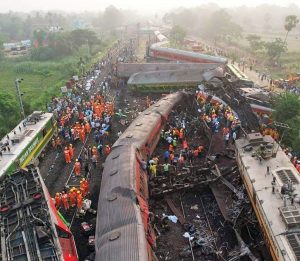ADVOCACYNET 397, June 29, 2023
Train Disaster in India Brings Uncertainty and Heartache to Poor Families
Poor families in Northeast India are still reeling from the deadliest railway disaster in modern Indian history, according to team members from Jeevan Rekha Parisad (Lifeline), a leading Indian non-profit group, who witnessed the accident and provided emergency aid.
The crash happened on June 2 when the Coromandel Express traveling from West Bengal to Tamil Nadu struck a stationary freight train while passing through the station of Bahanaga in Odisha State. A third train traveling in the opposite direction from Tamil Nadu ploughed into the three end compartments of the passenger train.
Several volunteers from Lifeline were at the station when the trains collided and remain traumatized by the experience, according to Rohit Samal, a member at the Lifeline team who is volunteering as a Peace Fellow for The Advocacy Project at Lifeline this summer.
According to the Odisha authorities, the death toll is still rising and currently stands at 314. One hundred and thirty-one survivors are being treated in hospital.
Mr Samal said that first responders are particularly distressed by the plight of passengers in the compartments that bore the brunt of the accident.
Most were too poor to afford tickets and were traveling free of charge, he said. But the absence of a ticket or ID card has made it difficult to put a name to the victims and 81 bodies have still not been identified. Seventy-five DNA samples have been sent to laboratories but have not produced any matches so far.
“This is one of the worst things – knowing that many families are still unaware of what happened,” said Mr Samal. Not only has a loved one suddenly disappeared, he said, but the families are unable to claim the substantial compensation offered by the Indian government.
Mr Samal has written a powerful blog ‘Cry of the Crashing Metals’ about a survivor, Rajan, who was returning home to celebrate his third wedding anniversary and watched in horror as the third train bore down on him. Several Lifeline staff lost friends in the disaster.
So far, Lifeline has distributed 653 food kits and provided trauma counseling to 373 survivors, but Mr Samal said that the overall relief effort has slowed considerably. The government has promised a million rupees ($12,200) in compensation to the next of kin – a very large sum in poor communities – which makes it essential not to give up on the effort to identify victims.
The Advocacy Project has partnered with Lifeline since early last year, when the group launched a campaign to vaccinate tribal people in two villages against COVID-19. The campaign secured full vaccinations for 876 villagers and was so successful that Lifeline has launched a drive to protect pregnant women and children against malaria in ten tribal villages.
The new project is well under way in spite of extreme heat of up to 45 degrees Centigrade and the railway disaster. We will report back in future bulletins and blogs from Mr Samal throughout the rest of the year.
Donate to Lifeline’s relief effort through our home page

